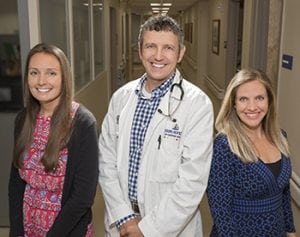 Johns Hopkins All Children’s Cancer & Blood Disorders Institute is expanding the scope and focus of services for teens and young adult cancer patients. The AYA Oncology program provides comprehensive, age-appropriate care for patients ages 15 to 21.
Johns Hopkins All Children’s Cancer & Blood Disorders Institute is expanding the scope and focus of services for teens and young adult cancer patients. The AYA Oncology program provides comprehensive, age-appropriate care for patients ages 15 to 21.
When it comes to cancer, the needs of teenage and young adult patients are different from those of both younger and older cancer patients. AYA patients benefit from a program that combines expertise in curing cancers commonly found in this age group with understanding of their overall medical and psychosocial needs.
There are fewer than two dozen comprehensive AYA oncology programs in the United States, explains Dr. Peter Shaw, who currently serves as the program’s medical director as well as deputy director of the Cancer & Blood Disorders Institute (CBDI). He joined JHACH in 2016 from Children’s Hospital of Pittsburgh and University of Pittsburgh Medical Center, where he developed and led a pre-eminent AYA oncology program.
Nationally, cancer is the leading disease-based cause of death in patients ages 15 to 39, and improvements in survival rates in this age group have not kept up with the advances seen in younger cancer patients. Most oncology patients younger than 15 are treated at tertiary-level pediatric centers such as JHACH, where they have access to the latest clinical trials and therapies, plus multidisciplinary care and support. However, national data shows that this begins to change for oncology patients at age 15.
Fewer than 10 percent of patients ages 15 to 39 receive care at a tertiary cancer center, and only a small portion are enrolled in a clinical trial. Diagnosis may be delayed because primary care physicians may not suspect cancer in this age group, and patients are less likely to have health insurance and access to care.
Cancers in AYA patients often more closely resemble cancers of childhood, and the physicians who mainly treat older adults are less familiar with the biology of these cancers and the latest treatment approaches.
Interdisciplinary Care
The AYA Oncology Program is led by Dr. Shaw along with pediatric oncology nurse practitioners Mindy Duren and Kelly Lawless, who will see patients along with their primary oncologist and add continuity and accessibility by serving as the first-line contact in the outpatient setting. A new gift from the Chenevert Foundation helps support the nurse practitioners’ role on the AYA team.
Each patient will have a primary oncologist who is an expert in their specific form of cancer or treatment modality (blood and marrow transplant). Adolescent medicine specialist Dr. Jasmine Reese and clinical psychologist Dr. Melissa Faith are also part of the core AYA team. Many of the CBDI physicians will provide disease-specific expertise and serve as a patient’s primary oncologist based on their areas of clinical focus.
Fertility preservation services will be available through collaboration with USF Health.
JHACH already has a close collaboration, led by Dr. Damon Reed, with Moffitt Cancer Center for adolescent and young adult sarcoma patients. Shaw expects this cooperation will expand to certain other cancers, stem cell transplant and immunotherapy, along with case-by-case clinical conferences and shared tumor board discussions, and social support. AYA events and activities will provide opportunities for peer-bonding that are especially important in this age group.
Accessing the AYA Program
Current CBDI patients are directly referred to the AYA program and matched to an oncologist who is an expert for their diagnosis. Patients admitted to the hospital for a new diagnosis will have a primary oncologist, and the nurse practitioners will guide their outpatient care.
The program will maintain an AYA database to track clinical trial enrollment, outcomes and other key metrics in order to address the “treatment gap.” The goal is to create new pathways of care to help these young adults with cancer become healthy adults.